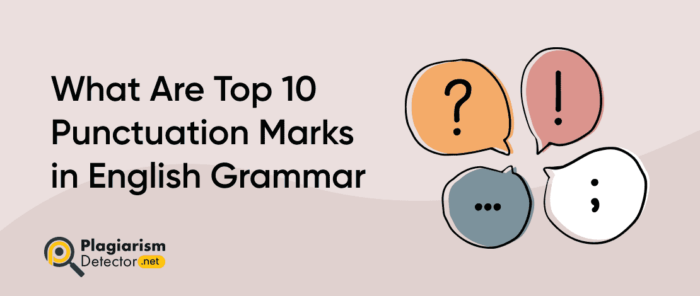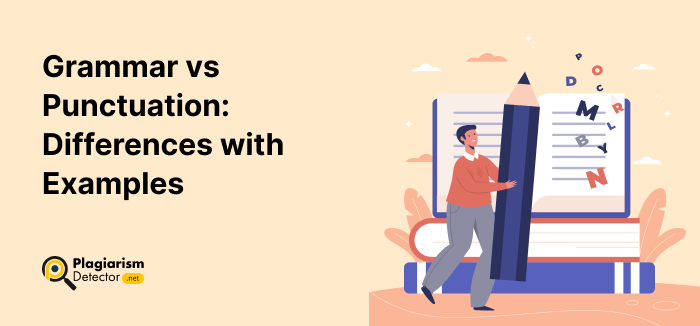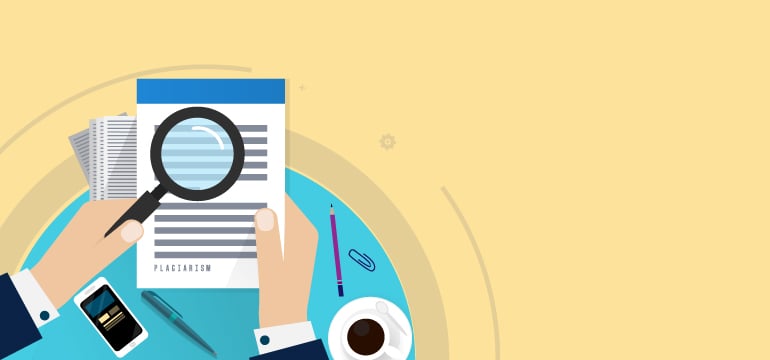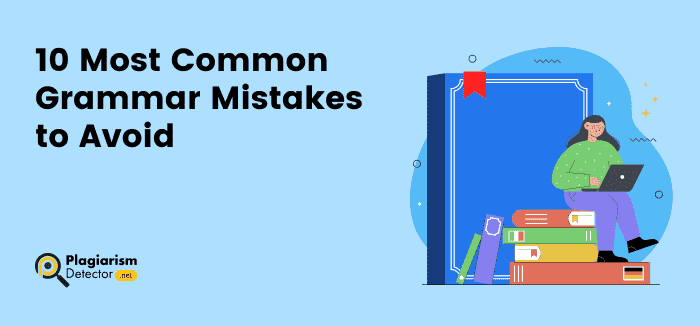What Are Top 10 Punctuation Marks in English Grammar?

Writing in a second language is always a challenging task. Less familiarity with grammar rules and improper vocabulary are some major reasons that make it hard for an individual to write quality content. This causes serious issues if you desire to impress your readers or inspire your instructors with your words but lack writing skills.
If you are one of those individuals who are facing such issues, then you are not alone. Millions of individuals face similar problems when they are asked to write quality content in the English language. However, striving to learn grammar may improve your chances of becoming a pro writer.
Importance of Punctuation
Punctuation offers a great opportunity to add emphasis to your written sentences. It fills our writing with an appropriate intonation. For example, we can pause, stop, emphasize, or question using a comma, a period, an exclamation point, or a question mark. This will surely enhance clarity and precision in writing and guide the readers on when to stop, pause, or emphasize certain parts of the sentence.
If you also find punctuation tricky and confusing, then this blog post is mainly for you. In this post, we will discuss a few of the most prominent punctuation marks. Reading this post till the end will explain you about punctuation checker and help you master your writing and craft an article or novel like a pro!
10 Most Common Punctuation Marks with Examples
A few of the most commonly used punctuation marks are discussed below.
Period (.)
This is one of the most used punctuation marks in writing. It is also known as a full stop, which is mainly placed at the end of a sentence. It denotes the completion of a sentence. A full sentence is one that has a complete structure.
The following example will display a period at the end of a sentence:
- It is raining outside.
Periods are also frequently used in abbreviations, like in names or titles.
The following examples will guide you on how to use a period in abbreviations:
- Dr. Shaw isn’t available today.
- Mr. K. Smith visited my office yesterday.
Question Mark (?)
The question mark is another punctuation mark which is used to end a sentence. But this mark ends a sentence that is a direct question. Mostly, sentences that are also questions start with how, what, when, where, how, and who.
The following example will help you learn how to use a question mark in a sentence:
- When will you go to the office?
- What is the name of this movie?
Usually, a question mark also depicts a shift in tone in a sentence if it’s being read out loud. Therefore, you also need to pay attention to it as well.
Exclamation Point (!)
An exclamation point (also known as an exclamation mark) is also used at the end of a sentence. However, this punctuation mark is used when that sentence conveys an intense emotion. The expression can define different emotions, including excitement, disgust, anger, joy, or anything else. Exclamation marks are used to add emphasis to a sentence.
An example of an exclamation mark is shared below.
- “See you later!” she said.
- I am looking forward to meeting you tomorrow!
Comma (,)
To know how to use commas correctly in your content, you need to insert a pause in a sentence for different reasons, such as to separate ideas and phrases or change the structure of a sentence.
The comma has different uses. For example, commas can be used to add a direct address, such as:
- Brad, I hope to see you again.
Commas are also used to separate two complete sentences:
- He went to play football, and then he went with friends for dinner.
Commas are also preferred to list items in a sentence:
- Sam loves playing football, cricket, snooker and badminton.
To find the actual space of comma is a little difficult than all other punctuaiton marks. So should also go for comma checker once before publising the content or submitting your writing task to the authority.
Colon (:)
There are three major uses of colons. The first use of the colon is to introduce something, like a quote, example, or idea.
For example,
- I have four favorite colors: Red, Blue, Green, and Purple.
The colon is also used to connect two independent clauses if the second clause completes the first one.
For example:
- I don’t like staying here anymore: it is already too late.
Semicolon (;)
A semicolon is also used to link two independent clauses, just like colons. But, the clauses are more relevant than the situation when you use a colon.
For example,
- I may not attend the meeting tomorrow; I am not feeling well.
Another use of semicolons is within a list that includes commas.
For example:
- I traveled to different places, including London, England; Tokyo, Japan; and Rome, Italy.
Dash (-)
Dashes have two different types. Both have different sizes and uses.
En dash: This type of dash is shorter in length and used to denote a range, such as between numbers or dates.
For example:
- I lived in this city from 2004 – 2008.
- I will take the Paris-New York flight tomorrow.
Em dash: this dash is longer than en dash and is mainly used instead of other punctuation marks, like commas, colons, or parentheses. Here’s an example:
- He categorically said — No!
Hyphen (-)
A hyphen may seem like a dash, but it’s completely different. A hyphen is used in compound words when two or more words are connected.
For example
- Free-to-use
- Brother-in-law
- One-by-one
Brackets ([])
Brackets are mainly used to bring clarity to any statement or clarify technical terms. It is also used to define others’ statements or quotations.
For instance,
- She [Ms. Sara] says that the offer is still valid.
- Shaw said that “[Snooker] is my favorite indoor game.”
Quotation Marks (“)
Quotation marks are majorly used to state words, speech, or text written or spoken by someone else.
- “I don’t want this pair of shoes,” said Mrs. White.
- Sam told me that he “likes to go with his friends.”
Similarly, single quotation marks are mostly used for a quote within a quote.
For example,
- Natasha said to her father, “Catherine didn’t attend the class and said she was in the library to ‘complete the written assignment’ to avoid any punishment.
Final Words
Punctuation marks are highly crucial in English writing. The information shared in this blog post would have helped you learn about the top 10 most commonly used punctuation marks. Moreover, the examples shared above would have guided you on how to use these punctuation marks in your writing perfectly. You can also check the flawlessness of your punctuation marks by running a grammar check test on your content. This will definitely help you in crafting quality content that can inspire your readers.




